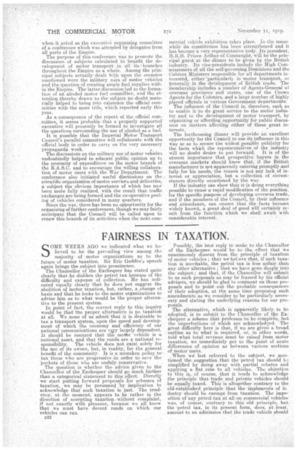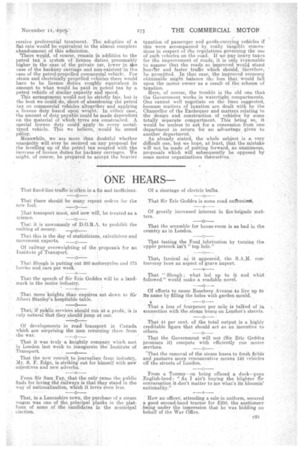FAIRNESS IN TAXATION.
Page 2

Page 3

If you've noticed an error in this article please click here to report it so we can fix it.
SOME WEEKS AGO we indicated what we believed to be the prevailing view among .the majority of motor organizations as to the future of motor taxation. Sir Eric Geddes's speech again brings the subject into 'Prominence.
The Chancellor of the Exchequer has stated quite clearly that he dislikes the petrol tax because of the difficulty and expense of collection. He has indicated equally clearly that he does not suggest the abolition of motor taxation, but, rather, a change ot basis and that he looks to the motor organizations to advise him as to what would be the proper alterna tive to the present system.
In point of fact, the correct reply to this inquiry would be that the proper altetnative is no taxation at all. We none of us admit that it is desirable to tax a transport system, upon the speed and development of which the economy and efficiency of our national communications are ivy largely dependent. It. should be realized that the rnotler vehicle is a national asset, and that the roads are a national responsibility. The vehicle does not exist solely for the nee of its owner, but, in reality, for the general benefit of the community. It is a mistaken policy to tax 'those who are progressive 'in order, to save the pockets of those who are unduly conservative.
The question. is whether the advice given to the Chancellor of the Exchequer should go much further than a categorical statement to this effect. Directly we start putting forward proposals for schemes of taxation we May be presumed 'by implication to acknowledge that such taxation is just. The tendency, at the moment, appears to be rather in the direction of accepting taxation.. without complaint, if not, exactly with pleasure, because we all know that we must have decent roads on which our vehicles can run.
.02
Possibly, the best reply to make to the 'Chancellor of the Exchequer would be to the effect that we unanimously dissent from the principle of taxation of motor vehicles ; that we-bel:eve that., if such taxation is inevitable, the petrol tax is less unfair than any other alternative ; that we have gone deeply into the subject ; and that, if the Chancellor will submit to us such proposals as may be framed by his official advisers, we should be glad to comment on those proposals and to point out the probable consequences of their adoption, at the same time proposing such amendments as we consider to-be particularly necessary and stating the underlying reasons for our proposals.
The alternative, which is apparently likely, to be adopted, is to submit to the Chancellor of the Ex' chequer a scheme that professes to be complete, but the imperfections of which are acknowlede•ed. The great difficulty here is that, if we are given a broad outline as to what is required, or, in other words, told what total revenue must be raised from motor taxation, we immediately get to the point of acute differences of opinion as between various sections of motor users.
When wiS last referred to the subject, we mentioned the _suggestion that the petrol tax should ba simplified by doing. away with partial rebates and applying a flat rate to all vehicles. The objection to this is, of course, that it tends to acknowledge the principle that trade and private vehicles should be equally taxed. This is altogether contrary to the old-established principle 'that the implements of ih dustry should be exempt from taxation. The imposition of any petrol tax at all on commercial vehicles was, of course, contrary. to this old principle, but.. the -petrol tax, in its present form, does, at -least. amount to an admission that the trade vehicle should receive preferential treatment. The adoption of a flat rate would be equivalent to the almost complete abandonment of this admission.
'There would, of course, remain in aclditibn to the petrol tax —a systern of licence duties, presumably higher in the case of the private car, lower in the case of the hackney carriage and non-existent'in the ease of the petrol-propelled commercial vehicle. For steam and electrically propelled vehicles there. would have to be licence duties roughly equivalent in amount to what would be paid in petrol tax by a petrol vehicle of similar capacity and speed. This arrangement would not be strictly fair, but is the best we could do, short of abandoning the petrol tax on commercial vehicles altogether and applying a licence duty 'based upon weight. In either case, the amount of duty payable could be made dependent on the material of which tyres are constructed. A special licence duty could apply to every metalty,red vehicle. This we believe, would be sound Meanwhile, we are more than doubtful whether nnanimity, will, eVer be secured on any proposal for the levelling up of the petrol tax coupled with the increase of licence duties for hackney carriages. We might, of course, be prepared to accept the heavier taxation 'of passenger and goodseenrrying vehicles if this were accompanied by really tangible concessions in respect of the regulations governing the use of such vehicles on the road. If we pay heavy taxes. for the improvement of roads, it is only reasonable to Assume that the roads so improved would stand heavter and later traffic which should, therefore, ' be permitted. In that case, the improved economy obtainable might balance the loss that 'would fall upon the motor owner as a result of the scheme of taxation.
Here, of course, the trouble is the old one thati the Government. works in watertight. compartments. One cannot well negotiate on the lines suggested, 'because matters of taxation are dealt with, by the Chancellor of the Exchequer and matters relating to. the 'design and construction of vehieles by some . totally separate compartment. This being so, it, would be iiseless to ask for a concession from one department in return for an advantage given to another department. As already stated, the whole subject is a very difficult, one, but we hope, at least, that the mistake will not be made of putting forward, as unanimous, proposals which will subsequently be opposed by some motor organizations themselves.




























